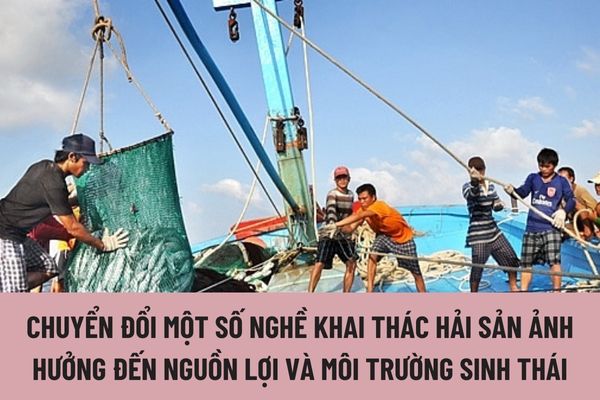The Government of Vietnam sets the goal of converting approximately 2,000 fishing vessels to aquaculture.
Transfer approximately 2,000 fishing vessels to aquaculture by 2025?
Pursuant to Point 2, Clause 2, Article 1 of Decision 208/QD-TTg in 2023, it is stated as follows:
Specific Goals
a) By 2025
- Transition approximately 2,000 fishing vessels operating in coastal and inshore areas from fishing to aquaculture, aquaculture services, recreational fishing, professions that the localities are oriented to develop, or participate in tourism guidance in conservation areas, protection of aquatic resources, and not violating legal regulations, specifically:
+ Convert 1,000 fishing vessels operating in coastal areas (fishing vessels with a maximum length from 6 meters to under 12 meters).
+ Convert 1,000 fishing vessels operating in inshore areas (fishing vessels with a maximum length from 12 meters to under 15 meters).
- Transition 1,000 fishing vessels operating in offshore areas that significantly affect aquatic resources and ecosystems to professions that have less impact on aquatic resources, environment, and ecosystems. To be specific:
+ Convert 700 trawling vessels operating offshore to farming, trapping, lighting, surrounding nets, hooking, and logistic services;
+ Convert 300 gill net tuna vessels operating offshore to farming, trapping, lighting, surrounding nets, hooking, and logistic services.
- Train and retrain 50,000 fishermen with converted fishing vessels to suitable new professions.
The scheme aims to achieve by 2025:
- Transition approximately 2,000 fishing vessels operating in coastal and inshore areas from fishing to aquaculture, aquaculture services, recreational fishing, professions that the localities are oriented to develop, or participate in tourism guidance in conservation areas, protection of aquatic resources, and not violating legal regulations.
- Transition 1,000 fishing vessels operating in offshore areas that significantly affect aquatic resources and ecosystems to professions that have less impact on aquatic resources, environment, and ecosystems.
With a vision toward 2045, Vietnam aims to completely transition fishing vessels with significant impact on marine resources, environment, and ecosystems to other professions; contributing to the protection of aquatic resources, improving the management efficiency of the fishing fleet, stabilizing the livelihoods of fishermen; and participating proactively and responsibly in the sustainable development of the fishing sector.

the Government of Vietnam aims to transition approximately 2,000 fishing vessels to aquaculture? (Image from the Internet)
What is the perspective of the Prime Minister of Vietnam regarding the project to convert some fishing professions affecting resources and ecological environment?
According to Clause 1, Article 1 of Decision 208/QD-TTg in 2023, the perspective of the Prime Minister of Vietnam regarding the project to convert some fishing professions affecting resources and ecological environment is as follows:
- The Scheme must be built and implemented according to the principles and policies of the Communist Party, the State, and the Action Program of the Government of Vietnam to implement Resolution 36-NQ/TW in 2018 and Decision 339/QD-TTg in 2021 of the Prime Minister of Vietnam regarding the Strategy for the development of Vietnam's fisheries by 2030.
- The Scheme must conform to the Law on Fisheries in 2017 and the development orientation of the Fisheries sector based on reorganizing and reallocating fishing vessels in accordance with the sustainable exploitation capability of aquatic resources; combating illegal, unreported, and unregulated fishing; in accordance with the principles of the Code of Conduct for Responsible Fisheries of the Food and Agriculture Organization (FAO) and relevant international treaties to which Vietnam is a signatory; contributing to affirming the sovereignty of the nation's seas and islands.
- Optimize the use of resources, investment capital, the efficient use of aquatic resources and aquatic ecosystems; linking exploitation with environmental protection; improving exploitation efficiency through linkage production chain from exploitation, purchase to processing, product consumption to increase income, and create new livelihoods for people to stabilize production for fishermen.
What solutions are recommended for enhancing leadership, direction, and management of fishing activities?
According to Clause 5, Point 1, Article 1 of Decision 208/QD-TTg in 2023, the solutions for enhancing leadership, direction, and management of fishing activities are clearly specified as follows:
- Develop five-year and annual programs and plans with specific objectives for fishing in each sea area corresponding to the responsibility of each locality as a basis for patrol, inspection, and monitoring of results according to the set plans; promote the establishment of local fisheries inspection forces in coastal provinces and cities to strictly control fishing activities in coastal and inshore areas.
- Establish inter-sectoral coordination mechanisms in management, inspection, control, rescue, disaster relief, and sea information systems between the Ministry of Agriculture and Rural Development and other related parties.
- Construct factories and collection points for marine waste to process and collect; establish groups and teams of marine area sanitation workers for localities with marine and coastal areas.
- Strictly manage the implementation of fishing permits quotas issued by the Ministry of Agriculture and Rural Development for offshore fishing vessels and by the localities for inshore and coastal fishing vessels.
- Strictly monitor and control the catch from fishing fleets as per regulations when fishing vessels dock to unload products. Prevent and handle vessels without licenses, expired licenses, and those operating contrary to the contents of their licenses from participating in fishing activities.
LawNet